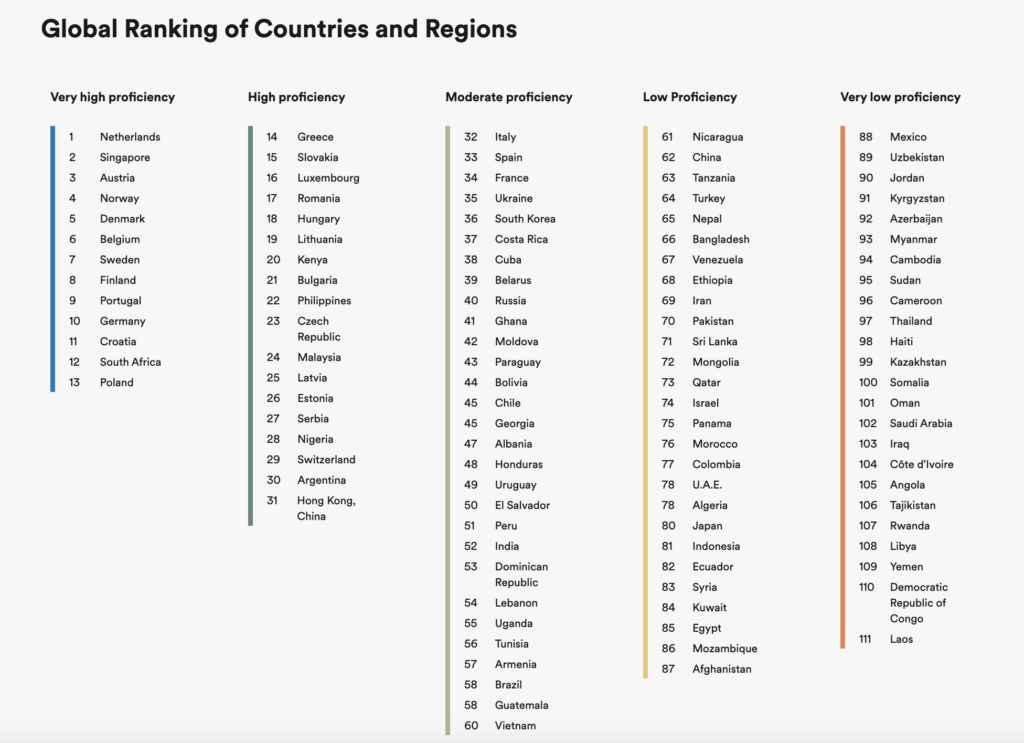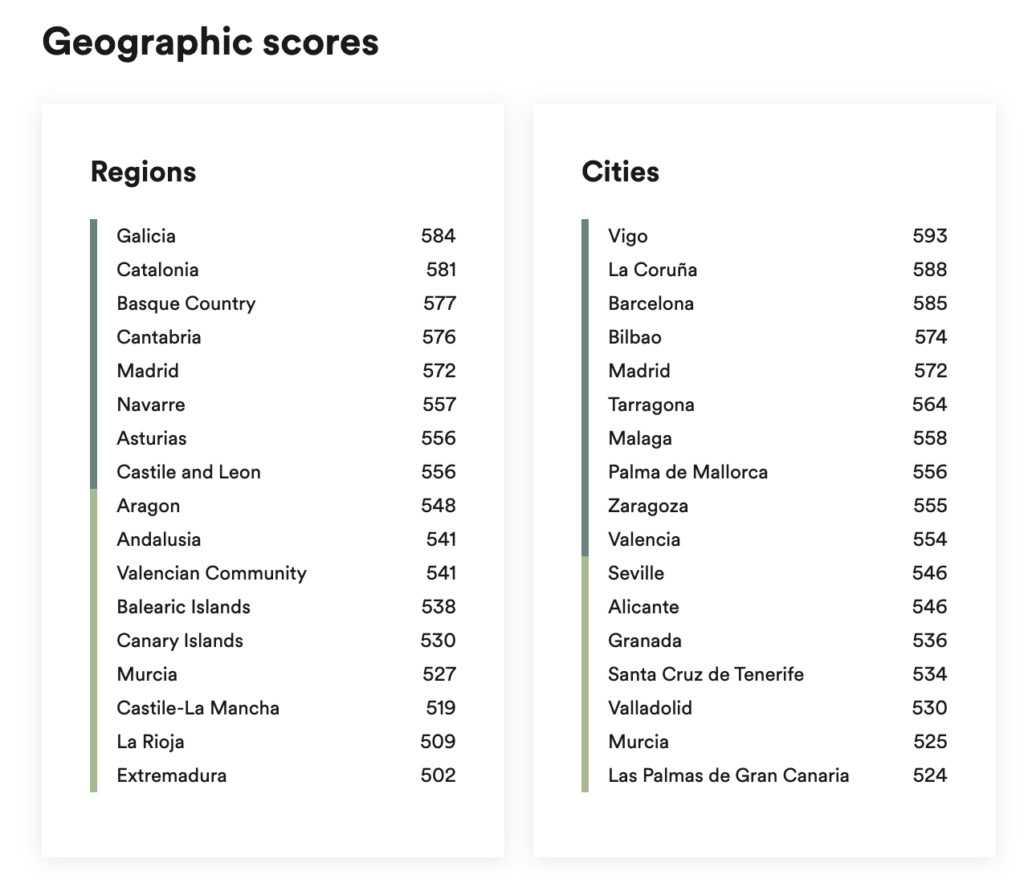Gather ’round, folks, it’s time to talk about the best non-native English speakers in the world! English may be a universal language, but not everyone is a native speaker, and that’s okay. In fact, some of the best English speakers in the world are non-natives.
In a yearly international study of English proficiency, the EPI (English Proficiency Index) once again, and for the 4th year in a row, has seen the Netherlands, with a score of 661, come out on top and been ranked the world’s best non-native speakers of English. The country remains at the top of the list, with Sweden, last year’s runners-up, being relegated to 7th place. The Netherlands, along with Singapore and Austria make up the top 3, followed by Norway and Denmark. The top 13 countries received a score of over 600, giving them the elite status of having a “very high proficiency” level.
The report is based on a comparison of English skills measured by testing 2.1 million people, who voluntarily applied to take the test, in 111 countries and regions around the world.
English is the most widely spoken language in the world, but it is worth knowing that the vast majority of speakers are not “native.” Of the roughly 1.5 billion people in the world who speak English, over 1.1 billion speak it as a second language.
The country with the lowest English proficiency in this study came out as Laos, getting a score of 364 and just above them the Democratic Republic of Congo and Yemen, with scores of 367 and 370, respectively.
Which EU countries are the worst at speaking English?
Azerbaijan has the lowest level of English proficiency of any country in the European Union, according to the study. The country was given 92nd place overall and placed in the “very low proficiency” group with a score of 440.
Spain came in 33rd in the “moderate proficiency” group just behind Italy with a score of 545 (43 points higher than the average score). Taking into consideration only European countries, Spain fared 25th out of 35 countries which leaves a lot of room for improvement.
Geographic Scores - Spain
As can be seen for the geographic scores in each region of Spain, the Galicians top the ranking with Las Palmas de Gran Canaria bringing up the rear.
Recent trends - Spain
The trend over the last 6 years has been somewhat stable, with Spain hovering over the 30 mark and getting a score within the “moderate proficiency” group each time.
The EPI and the CEFR (Common European Framework of Reference)
The English Proficiency Index places the surveyed countries and territories into five proficiency bands, from Very High to Very Low:
|
CEFR |
EPI Score |
|
C2 |
700-800 |
|
C1 |
600-699 |
|
B2 |
500-599 |
|
B1 |
400-499 |
|
A2 |
300-399 |
|
A1 |
200-299 |
|
Pre-A1 |
1-199 |
- The Very High Proficiency band corresponds to CEFR level C1.
- The High and Moderate Proficiency bands correspond to CEFR level B2, with each EPI band corresponding to half of the CEFR level.
- The Low Proficiency band corresponds to the upper half of CEFR level B1.
- The Very Low Proficiency band corresponds to the lower half of CEFR level B1 and A2.
In the chart below, there are examples of tasks that an individual could accomplish at each proficiency band. It can be used as a useful reference for understanding how skills advance across the bands.
It is important to keep in mind that a proficiency band merely indicates the level of the “average” person.
Very High
EPI score 600+
- Use nuanced and appropriate language in social situations
- Read advanced texts with ease
- Negotiate a contract with a native English speaker
High proficiency
EPI score 550 – 599
- Make a presentation at work
- Understand TV shows
- Read a newspaper
Moderate proficiency
EPI score 500 – 549
- Participate in meetings in one’s area of expertise
- Understand song lyrics
- Write professional emails on familiar subjects
Low proficiency
EPI score 450 – 499
- Navigate an English-speaking country as a tourist
- Engage in small talk with colleagues
- Understand simple emails from colleagues
Very low proficiency
EPI score < 450
- Introduce oneself simply (name, age, country of origin)
- Understand simple signs
- Give basic directions to a foreign visitor
The best non-native speakers according to us at Complete English Club!
First up, we have Penélope Cruz Sánchez who was born in Madrid, and always loved to perform. At a young age she got into ballet dancing, but she soon moved into theatre and began winning roles on Spanish TV. Her big break came when she was spotted by cult Spanish director Pedro Aldomovar. She has remained his muse ever since, appearing in many of his finest works, and it was due to this relationship with Aldomovar that she gained recognition in the US.
In the early 2000s Penelope enchanted Tom Cruise while filming the movie “Vanilla Sky” and gained a huge new American fan base at the same time.Her captivating looks, as well as her deliciously exotic Spanish accent, makes her one of the most sought after actresses in the business. Along with her husband Javier Bardem, they make a true power couple when it comes to non-native speakers conquering Hollywood.

Next, we have one of the most famous Austrians ever, Arnold Schwarzenegger. Even though Austria finished 3rd last year in the EPI study, the former governor of California and action movie star didn’t learn English until he moved to the United States. But would you really know he wasn´t a native by listening to him? Probably, but his English is pretty good and he´d give you a kicking if you said otherwise.

Another great non-native English speaker is Jackie Chan. The Hong Kong-born actor and martial artist may not have been born speaking English, but he’s fluent in the language now. And, let’s face it, his ability to speak English has only added to his charm and made him even more likeable. And if you don´t like his English, don´t even think about telling him, because he´ll kick your arse also.

And who could forget about Sofia Vergara? The Colombian-born actress may not have been born speaking English, but she’s mastered the language so well that she’s become one of the biggest stars on television. Vergara’s English is so good that you’d never know she wasn’t a native speaker, and her sense of humor only adds to her appeal.

In conclusion, these are just a few examples of the best non-native English speakers in the world. With hard work and dedication, anyone can become fluent in English, even if it’s not your native language. So, the next time you’re feeling down about your English skills, take inspiration from others success. And remember, as long as you can make people laugh and understand what you’re saying, you’re doing pretty damn good!
GLOSSARY
All the words in the blog highlighted in RED are explained below :
to gather (v) – to get information/people with one thing in common together
to rank – ranked (v. past) – to give a place in a grading system
runners-up (n) – second place
to relegate – relegated (v. past) – to assign an inferior position to
vast (adj.) – enormous
roughly (adv.) – approximately
to fare – fared (v. past) – perform in a specified way in a certain situation
to hover – hovering (adj.) – remain at or near a particular level
to accomplish (v) – achieve or complete successfully
merely (adv.) – only
nuanced (adj.) – characterized by subtle shades of meaning
to get into – got into (v. past) – to start doing something regularly
to spot – spotted (v. past) – to find amongst a lot of
muse (n) – person who is the source of inspiration for an artist
enchanted (adj.) – to fill someone with great delight
sought after (adj.) – much in demand
charm (n) – the power or quality of attracting or fascinating others
likeable (adj.) – something/someone that is easy to liked
to master – mastered (v. past) – to acquire complete knowledge or skill


